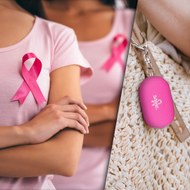October is Breast Cancer Awareness Month—Here’s How You Can Show Your Support
Each year in the United States, about 264,000 women get breast cancer ( CDC). This year an estimated 2,800 men will be diagnosed, and 43,700 women will die from the disease (National Breast Cancer Foundation).
For nearly 40 years, October has been recognized as Breast Cancer Awareness Month in the United States. Since 2008, SABRE has proudly supported the National Breast Cancer Foundation (NBCF) and donated over $2.5 million to educate individuals and raise awareness about the prevalence and impact of breast cancer, the importance of early detection, and the preventative measures you can take.
A percentage of sales from purchases of SABRE pink NBCF pepper sprays and personal alarms is donated to help support NBCF and its mission to help and inspire those affected by breast cancer through education of the importance of early detection. When breast cancer is detected early, in the localized stage, the 5-year survival rate is 99 percent (American Cancer Society).
Pink Personal Alarm with LED Light, Supports NBCF
1 in 8 women will be diagnosed with breast cancer in her lifetime, and you most likely know someone who has been affected by the disease—a family member, a friend, the mother of a friend, or even a coworker—breast cancer affects us all. Below are some key facts to educate yourself and those around you to help prevent breast cancer.
Schedule regular exams: Early detection is the key to beating breast cancer
- Women ages 40 and over should get a mammogram every year
- Women over the age of 20 should begin having an annual well-women exam and talk to their doctor about potential risk factors to determine when annual mammograms should begin
- Women 18 and older should conduct monthly at-home breast self-exams
Know your personal risk factors: These can increase your chance of breast cancer
- You are a woman over the age of 40
- You or someone in your immediate family has been previously diagnosed with breast cancer or ovarian cancer
- You or someone in your immediate family has tested positive for BRCA1 or BRCA2, a gene mutation that is associated with a higher risk of breast cancer
Keep healthy habits: These can reduce your risk for certain cancers
- Eat five or more servings of fruit and vegetables each day
- Get regular physical activity
- Maintain a healthy weight
- Limit alcohol intake to no more than one drink per day
- Do not smoke and quit smoking if you do
This month, and always, we encourage you to prioritize your health through annual screenings and mammograms. Take the NBCF Mammogram Pledge today.
Other Breast Cancer Resources:


